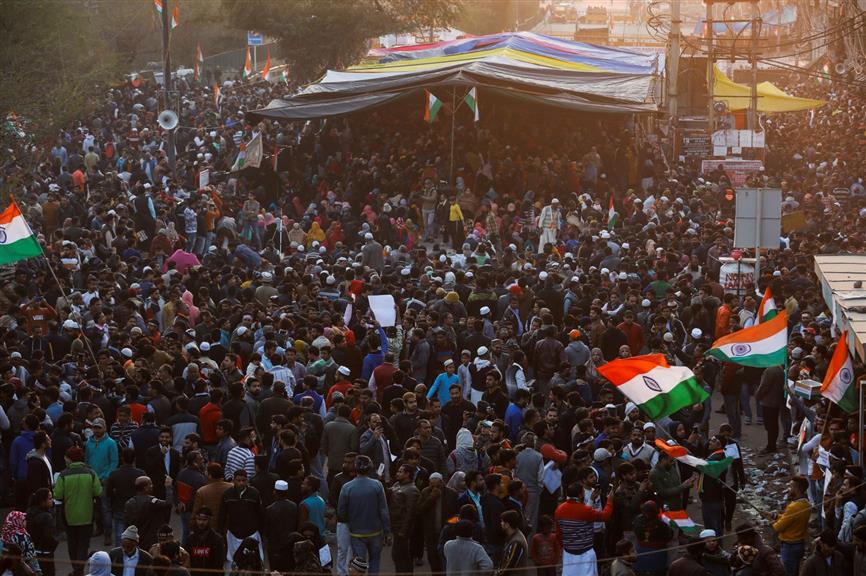
Demonstrators attend a protest against a new citizenship law in Shaheen Bagh, New Delhi, on February 2, 2020. — Reuters file photo
Satya Prakash
Tribune News Service
New Delhi, October 7
Maintaining that “democracy and dissent go hand in hand”, the Supreme Court on Wednesday ruled that roads and public spaces can’t be blocked indefinitely and demonstrations expressing dissent have to be in designated places alone.
Deciding petitions seeking removal of protesters against the Citizenship Amendment Act (CAA) from Shaheen Bagh in Delhi, a three-judge Bench headed by Justice SK Kaul said, “We have…no hesitation in concluding that such kind of occupation of public ways, whether at the site in question or anywhere else for protests is not acceptable and the administration ought to take action to keep the areas clear of encroachments or obstructions.”
Notified on January 10, the CAA relaxed norms for grant of Indian citizenship by naturalization to Hindu, Sikh, Christian, Buddhist and Jain and Parsi victims of religious persecution from Pakistan, Afghanistan and Bangladesh who came to India before December 31, 2014. The top court had on January 22 refused to stay the operation of CAA and NPR.
Though the protesters blocking the Kalindi Kunj-Shaheen Bagh stretch, including the Okhla underpass since December 15, 2019 -- were removed on March 24 after COVID-19 lockdown was enforced, the top court had chosen to keep the matter pending to clarify the legal position on the issue.
The court faulted the authorities for not taking any decision, saying, “Unfortunately, despite a lapse of a considerable period of time, there was neither any negotiation nor any action by the administration, thus warranting our intervention.”
The top court said, “In what manner the administration should act is their responsibility and they should not hide behind the court orders or seek support thereupon for carrying out their administrative functions. The courts adjudicate the legality of the actions and are not meant to give shoulder to the administration to fire their guns from.”
To emphasise the importance of right to peaceful protest, a Bench headed by Justice SK Kaul quoted Pulitzer Prize winner Walter Lippmann, who said, “In a democracy, the opposition is not only tolerated as constitutional, but must be maintained because it is indispensable.”
However, it said, “while appreciating the existence of the right to peaceful protest against a legislation, we have to make it unequivocally clear that public ways and public spaces cannot be occupied in such a manner and that too indefinitely. Democracy and dissent go hand in hand, but then the demonstrations expressing dissent have to be in designated places alone.”
Rejecting the contention of the protesters against the CAA, the Bench said, “The present case was not even one of protests taking place in an undesignated area, but was a blockage of a public way which caused grave inconvenience to commuters. We cannot accept the plea of the applicants that an indeterminable number of people can assemble whenever they choose to protest.”
Noting that the use of digital infrastructure has empowered movements to embrace their often-leaderless aspirations and evade usual restrictions of censorship, the top court said, “the flip side to this is that social media channels are often fraught with danger and can lead to the creation of highly polarised environments, which often see parallel conversations running with no constructive outcome evident.”
The court said it must be kept in mind that the erstwhile mode and manner of dissent against colonial rule cannot be equated with dissent in a self-ruled democracy as “our Constitutional scheme comes with the right to protest and express dissent, but with an obligation towards certain duties”.
It sought to emphasise that right to free speech and right to assemble peacefully under Article 19(1)(a) and Article 19(1)(b) of the Constitution are subject to reasonable restrictions, including those in the interests of the sovereignty and integrity of India and public order, and to the regulation by the concerned police authorities in this regard.
“Each fundamental right, be it of an individual or of a class, does not exist in isolation and has to be balanced with every other contrasting right, it noted.”
The petition was originally filed before the Delhi High Court, which had refused to issue any specific writ. However, it had said the authorities had all the powers, jurisdiction and authority to control traffic wherever protests or agitations were going on, in the larger public interest.
Join Whatsapp Channel of The Tribune for latest updates.



























